2016年学测六套试卷词汇与语法练习
大学英语六级(语法与词汇)练习试卷120(题后含答案及解析)
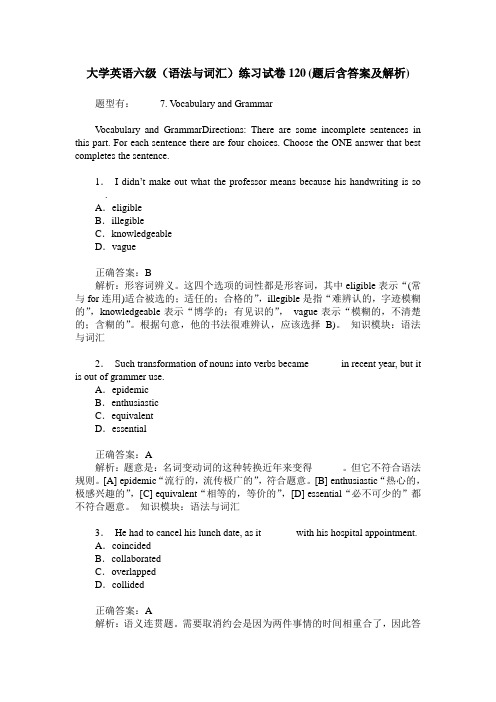
大学英语六级(语法与词汇)练习试卷120(题后含答案及解析) 题型有:7. V ocabulary and GrammarV ocabulary and GrammarDirections: There are some incomplete sentences in this part. For each sentence there are four choices. Choose the ONE answer that best completes the sentence.1.I didn’t make out what the professor means because his handwriting is so ______.A.eligibleB.illegibleC.knowledgeableD.vague正确答案:B解析:形容词辨义。
这四个选项的词性都是形容词,其中eligible表示“(常与for连用)适合被选的;适任的;合格的”,illegible是指“难辨认的,字迹模糊的”,knowledgeable表示“博学的;有见识的”,vague表示“模糊的,不清楚的;含糊的”。
根据句意,他的书法很难辨认,应该选择B)。
知识模块:语法与词汇2.Such transformation of nouns into verbs became______ in recent year, but it is out of grammer use.A.epidemicB.enthusiasticC.equivalentD.essential正确答案:A解析:题意是:名词变动词的这种转换近年来变得______。
但它不符合语法规则。
[A] epidemic“流行的,流传极广的”,符合题意。
[B] enthusiastic“热心的,极感兴趣的”,[C] equivalent“相等的,等价的”,[D] essential“必不可少的”都不符合题意。
大学英语六级词汇语法练习题及答案
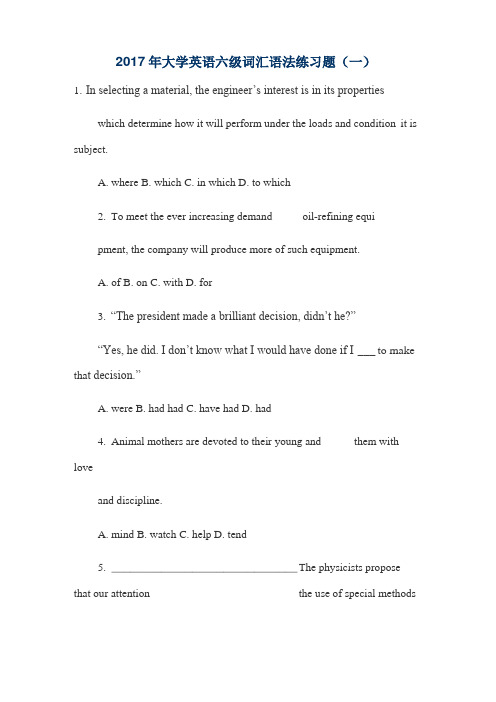
2017年大学英语六级词汇语法练习题(一)1.In selecting a material, the engineer’s interest is in its propertieswhich determine how it will perform under the loads and condition it is subject.A. whereB. whichC. in whichD. to which2.To meet the ever increasing demand _____ o il-refining equipment, the company will produce more of such equipment.A. ofB. onC. withD. for3.“The president made a brilliant decision, didn’t he?”“Yes, he did. I don’t know what I would have done if I ___ to make tha t decision.”A. wereB. had hadC. have hadD. had4.Animal mothers are devoted to their young and _____ them with loveand discipline.A. mindB. watchC. helpD. tend5.______________________________ The physicists propose that our attention __________________________ the use of special methodsof thinking and acting.A. would be directed towardsB. should be directed towardsC. is directed towardsD. directs towards6.According to the acoustics, continual exposure _____ noise of highintensity would lead to loss of hearing.A. ofB. withC. toD. by7.We are convinced ___ the righteousness of our cause.A. ofB. onC. overD. at8.Urban congestion would greatly be relieved if the ____ charged onpublic transport were more reasonable.A. pricesB. ticketsC. feesD. fares9.You’d better let me know as soon as there is a(n) _____ position in thebranch office.A. emptyB. vacuumC. hollowD. vacant10.They will never reconcile themselves to ____ .A. defeatB. their defeatC. be defeatedD. have their defeat11.The matter is not to be ___ .12.The mother almost ____ when she learned that her son was shot dead.A. fell downB. came downC. fell apartD. went to pieces13.While doing calculation for the project, the designers ______ a new solution to a geological problem.A. fell intoB. stumbled uponC. set outD. discovered14.I meant ___ you about it, but I forgot to do so.A. tellingB. having toldC. to tellD. to have told15.Everything ___ into consideration, I propose that the firstprize should be given to Liu Qiang.A. to takeB. takingC. takenD. took16.They ___ the park of late.A. will visitB. have visitedC. are visitingD. visited17.The girl was so ___ by the mighty river that she would spend hours sitting on its bank and gazing at the boats and rafts going and coming.A. absorbedB. fascinatedC. movedD. touched18.After traveling in the desert for many days, they found a tiny oasis,where there was a well and ____ green grass.A. a patch ofB. a bunch ofC. a pinch ofD. a packet of19.After a careful investigation, the committee decided to _____ theold hall.A. changeB. buildC. innovateD. renovate20.The fierce heat of this summer withered most of the crops ______his farm.A. inB. onC. ofD. from21.Since the father died a year ago, there has been _____ in thefamily about the division of the estate.A. distinctionsB. discordC. disadvantagesD. disappointment22.Having been discussed, the proposal was _____ u nanimously.A. adaptedB. adoptedC. admittedD. adjoined23.I’d just as soon you ______ those important papers with you.A. don’t takeB. didn’t takeC. hadn’t takenD. were not taking24.The theme of the novel is that a person’s fate___ that of thewhole country.A. is closely linked up withB. is closely dealt withC. is closely taken asD. is closely tired up with25.The American professor came to realize that he had underestimated the of most of the Chinese students.A. magnitudeB. gradientC. potentialD. firmness2017年大学英语六级词汇语法练习答案解析(一)1.答案D【参考译文】在选择材料时,工程师感兴趣的是决定该材料在负荷及遭受某种状况时所表现的特性。
2016年学测六套试卷词汇与语法练习
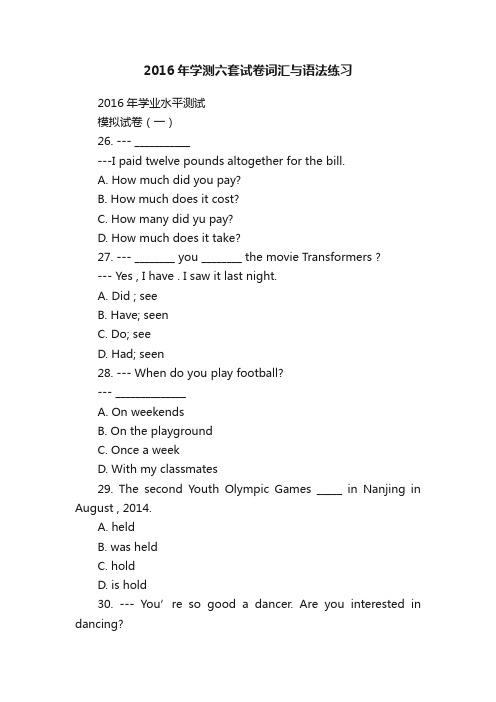
2016年学测六套试卷词汇与语法练习2016年学业水平测试模拟试卷(一)26. --- ___________---I paid twelve pounds altogether for the bill.A. How much did you pay?B. How much does it cost?C. How many did yu pay?D. How much does it take?27. --- ________ you ________ the movie Transformers ?--- Yes , I have . I saw it last night.A. Did ; seeB. Have; seenC. Do; seeD. Had; seen28. --- When do you play football?--- ______________A. On weekendsB. On the playgroundC. Once a weekD. With my classmates29. The second Youth Olympic Games _____ in Nanjing in August , 2014.A. heldB. was heldC. holdD. is hold30. --- You’re so good a dancer. Are you interested in dancing?---Of course. I _____ a member of the dancing club at school.A. use to beB. am used to beC. used to beD. used to do31. ______ exciting event it is! That really rocked!A. WhatB. HowC. What anD. How an32. --- I’m happy to meet so many Chinese here!---Yes. ______ of the students in this school are from China.A. One thirdB. First threeC. One threeD. First third33. Here are some tips _____ what to wear _____ your first day at your internship.A. of; inB. on; inC. with; atD. on; on34. ---May I ask about my ______?---Sure. 1,500 yuan a month. After three months , you’ll get 2,000 yuan a month.A. work hoursB. dutyC. salaryD. workplace35. ---I like playing basketball very much.---_______ . He often plays basketball after school.A. So do my brotherB. So does my brotherC. Neither does my brotherD. Nor does my brother36. ---Have you ever been to Lijiang?---Yes. I think Lijiang is _____ city in China.A. the beautifulB. the more beautifulC. the most beautifulD. most beautiful37. ---I _____ play the piano when I was only five years old.---Oh, you are really good.A. canB. couldC. can’tD. couldn’t38. English is spoken in many countries, _____ Britain, America and Canada.A. such asB. such forC. includeD. and39. ---Did Betty tell you ______?---No, she didn’t.A. why did she go to BeijingB. when she go to BeijingC. how she went to BeijingD. what she goes to Beijing40. When the house is on fire, you should stay ______ and tellthe operator your name andaddress.A. shyB. calmC. worriedD. frightened41. Many jobs require you _____ a uniform and tie long hair _______.A. put on; upB. wearing; onC. to wear; upD. put on; on42. ---What ______ John ______?---He is tall and thin.A. has; lookedB. does; likeC. is ; look likeD. does; look like43. Mike is among the top three interns in the hotel. He ______ finishes his work on time.A. alwaysB. sometimesC. seldomD. never44. Don’t forget _____ the door when you leave the classroom.A. closeB. to closeC. closingD. opening45. ---________ the guests ______ back, please let me know at once.---Yes, sir.A. As ; comeB. If; will comeC. If ; comeD. As ; came模拟试卷(二)26. ---Hi, Tom, I’ve left my schoolbag at home.---Don’t worry. I’ll _______ it for you.A. bringB. takeC. fetchD. carry27. We should _____ ourselves to the new environment.A. suitB. matchC. fitD. adapt28. When I took his temperature, it was two degrees above _______ .A. usualB. ordinaryC. commonD. normal29. Last year I _____ the 100-meter race and won second place.A. attendedB. took part inC. joinedD. join in30. Billy seems more _____ than Sally.A. friendlyB. patientlyC. politelyD. carefully31. ---How does your brother _____ his pocket money?---He spends part of his money on computer games , then _____ the rest in the bank.A. deal with; save upB. deal with; put upC. do with ; save upD. do with; put up32. My family trip was _____ because of the bad weather.A. called offB. called forC. called upD. called on33. The teacher might not come this evening. _____ , we won’t hold the party.A. In caseB. In any caseC. In that caseD. In no case34. Thank you for your offer , but I can manage it ______ .Which of the following is wrong?A. on my ownB. myselfC. of my ownD. by myself35. It is _____ for Billy to get an “A” in the English test.A. possibleB. probableC. possiblyD. likely36. The painting is ______ . You should not have sold it at sucha low price.A. great valueB. of great valueC. of great valuableD. very value37. ---I’ve never found a better job.--- _________.A. I don’t like itB. Never mind.C. Too bad.D. Congratulations.38. ---There are only 5 minutes until class starts.---Don’t worry. I think I will __________ .A. reach itB. finish itC. get itD. make it39. ---Hey, Sally. What’s the matter with your brother?---He _______ happy, because there _______ any presents for him.A. was; weren’tB. wasn’t; wereC. wasn’t; weren’tD. was; were40. Is it three hours _____ it takes the boy to come to schoolon foot?A. thatB. whichC. whenD. what41. ---Could I come here again tomorrow?---Yes, you ____________ .A. couldB. mustC. canD. should42. I saw him _____ behind the tree thinking.A. satB. seatedC. seatingD. seat43. ---Could you be so kind as to close the window?--- ___________A. With pleasure.B. Go ahead.C. It’s my pleasure.D. That’s OK.44. ---Mum , shall we watch Voice of China together this evening?--- ____________A. Not at all.B. You’re welcome.C. Never mind.D. I t’s a good idea.45. The doctor did all he could _____ the patient’s life.A. saveB. to saveC. savingD. saved模拟试卷(三)26. --- _____________---I’m fine.A. How are you?B. How do you do?C. May I help you?D. What’s the weather like?27. ---How’s the training going?--- _____________A. OK.B.In the training centre.C. Pretty good.D. That’s all right.28. --- ______ have you studied English?---For nine years. I started when I was nine years old.A. How oftenB. How muchC. How soonD. How long29. ---Is it heavy?---No. It’s as _____ as a book.A. heavyB. heavierC. lightD. lighter30. ---I’m going to have an important interview today.---Well, I’m sure you’ll do well.---But I don’t know __________ .A. how to sayB. what to sayC. to say whatD. to say how31. Let’s go shopping online, ____________?A. will youB. can youC. shall weD. won’t you32. ---Did Sally leave a message?---Yes. She wanted to know _____ go shopping with her.A. whether would youB. that you willC. when will youD. if you would33. ---Sally is a good student.--- ___________ , and _____________ .A. So she is; so you areB. So she is; so are youC. So is she; so are youD. So is she; so you are34. ---Do you know the girl _____ is in a red dress over there? ---Yes. She is my classmate, Sally.A. whoB. whichC. /D. whom35. ---Mum, need I leave for Suqian?--- ____________A. No, you mustn’t.B. No, you don’t.C. Yes, you need.D. Yes, you must.36. ---The washing machine in my room doesn’t work.---I will have someone _____ it for you.A. repairB. repairingC. repairedD. to repair37. ---What did Sally give you last night?---It was the book _____ I lent her last week.A. whatB. whichC. thatD. who38. Something is wrong with my keyboard. Could I use ______?A. myselfB. yourC. youD. yours39. ---I want to stay young forever.---What can you do to _____ that you will always stay young?A. proveB. ensureC. protectD. keep40. To solve such a difficult problem is _____ the little child.A. much too forB. much too toC. too much toD. too much for41. Only in this way _____ realize your dream.A. you canB. you can be able toC. can youD. can you be able to42. ---Do you mind if I smoke here?---_____ Go to the smoking room, please.A. Of course not.B. Yes, I do.C. No, I don’t.D. Yes, I don’t.43. You’d better not ask her for help. She will not try her best _____ she agrees to help you.A. althoughB. even ifC. becauseD. even so44. My new dress cost me ______ the last one that I bought.A. three times thanB. three times as much asC. three times as many asD. as three times much as45. It is no use _____ with a man like him.A. being arguedB. arguedC. arguingD. argues模拟试卷(四)26. ---What’s your plan for the coming May Day?---I have no idea now. I’m too busy to take _____ holiday at _____ present.A. a; anB. a; aC. the; theD. a; /27. ---Which course do you like _____ , English or Chinese?---I prefer English.A. bestB. betterC. moreD. most28. If she _____ back, I ________ you.A. comes; will tellB. came; toldC. will come; will tellD. comes; tell29. Sally likes _____ friends face to face.A. chatting withB. chatting toC. chatting onD. chatting of30. May Day is coming . We’ll _____ three days _____ .A. turn; offB. see; offC. rest; offD. have; off31. Sally bought a _____ mobile phone yesterday, for it’scheaper.A. usingB. usedC. usefulD. useless32. The cup is _____ hot water and the boy wants to have some.A. filled withB. fill withC. fulled ofD. full with33. When the bus _____ at the station, please call me.A. reachesB. arrivesC. getsD. moves34. ________ good time we had at the dinner party!A. WhatB. What aC. HowD. How a35. Is this the factory ______ you visited two years ago?A. thatB. whereC. in whichD. who36. Can I ______ smoke here?A. allowB. allow toC. be allowed toD. allowed37. --- _____ late for class again, Mary!---Sorry, I promise that I ________ .A. Don’t ; won’tB. Don’t be; willC. Don’t be; don’tD. Don’t be; won’t38. ---How about going to the movies?--- ____________A. Yes, I do.B. Good idea! Let’s go.C. No, I don’t.D. I like cartoons.39. The teacher says there will _____ an English test tomorrow afternoon.A. haveB. hasC. isD. be40. ---I’m Sally , a new student. It’s my first day here.--- ________ I’m Mr. Smith, the English teacher.A. Good luck!B. Congratulations!C.Welcome.D. What?41. I have bought two ball pens. _______ writes well.A. Neither of themB. None of themC. Neither of whichD. None of which42. ---May I ask about my ____________?---Sure . Answering the phone and dealing with the customer’s complaints.A. work hoursB. dutyC. salaryD. workplace43. The selfish man never offers help to others, ________?A. is heB. isn’t heC. does heD. doesn’t he44. One of your shop assistants _______ to my request.A. turned a deaf earB. turned a deaf eyeC. turned deaf earsD. turned deaf eyes45. Either you or I _____ going to attend the meeting tomorrow.A. isB. areC. beD. am模拟试卷(五)26. --- ______ do you go to the movies?---I go to the movies once a week.A. How oftenB. How muchC. How longD. How soon27. This is ______ dish that I have eaten.A. cheapB. the most cheapC. the cheapestD. cheaper28. --- How’s Sally’s test?---I don’t think she _____ the test. She isn’t good at it.A. won’t passB. is passingC. will passD. has passed29. What’s the time? My watch ____________.A. has stoppedB. is stoppingC. stopsD. stopped30. I don’t think he is true, ______?A. don’t IB. do IC. isn’t heD. is he31. You will be successful ______ you study hard.A. as long asB. onlyC. butD. unless32. Sally said she _______ English at that moment.A. studiedB. was studyingC. had studiedD. is studying33. The boy, _______ father is an English teacher, is my classmate.A. whoB. whichC. whomD. whose34. Our school ________ for 100 years.A. has been builtB. is builtC. was builtD. has built35. _______ after a big meal. It’s not good for your health.A. SwimB. Don’t swimC. Do swimD. Don’t to swim36. E-mail, as well as telephones, _____ widely in our daily life.A. is being usedB. have usedC. are being usedD. were used37. The ______ from the top of the mountain is beautiful.A. lookB. signC. viewD. see38. I hate apples and _______ eat them.A. alwaysB. oftenC. neverD. usually39. I prefer _______ at home rather than _______ out in the heavy rain.A. staying; goingB. to stay; to goC. stay; goD. to stay; go40. ---I ______ the meeting yesterday.---Why? Did something bad happen to you?A. should have attendedB. shouldn’t have attendedC. have been attendedD. attended41. ---How about playing basketball with me this weekend?--- _________A. I’m busy.B. I’d love to.C. Why?D. Right.42. My suggestion is that he ______ for a walk after supper because it’s good for health.A. goes outB. going outC. go outD. went out43. ---May I bring this cellphone to school?---No, you ________ .A. can’tB. may notC. needn’tD. aren’t44. Many small towns in my country are worth ________ .A. visitB. visitingC. being visitedD. to visit45. People ________ in the factory do not know the pleasure of country life.A. workB. to workC. workedD. working模拟试卷(六)26. ---Tom , may I play basketball with you?--- ______________ ?A. Why not youB. Why notC. May youD. Why do you27. ---It’s said that a star concert will be held in our school next month.---Wow! ________ We can see many stars.A. What an exciting news!B. What exciting news!C. How excited the news is!D. How exciting news!28. ---Could I use your car tomorrow morning?---Sure. I ________ a report at home.A. will be writingB. will have writtenC. have writtenD. have been writing29. ---Yeah, Mum. What’s the matter?---There is _________ cooking oil left in the bottle. Would you go to the corner store and get _________?A. a little; someB. little; anyC. little; someD. a little; any30. ---Why are you so sad?---Because I think even if the snow melts tomorrow, the ______ is already done.A. damageB. destroyC. ruinD. hurt31. ---You shouldn’t have quarreled with your mother yesterday.---Well, now I regret ______ that.A. to doB. doingC. to have doneD. to be doing32. ---Does Jimmy always go to school by bus?---No. Rather than ______ on a crowded bus, he always prefers ______ a bike.A. ride; rideB. riding; rideC. ride; to rideD. to ride; riding33. ---It seems that you are very happy today.---I ______ have a chance to go to Hong Kong Disneyland next week.A. am enough lucky toB. am lucky enough toC. am to enough luckyD. am lucky to enough34. ---What is the new trend here in winter?---The new trend here is ______ in the cold.A. working inB. working atC. working outD. working on35. Whenever I made mistakes, the teacher pointed them out with ______ .A. curiosityB. satisfactionC. envyD. patience36. ---Sally, please help me solve the problem, will you?---Sorry, but it’s said that our monitor has ______ a way to deal with it.A. come up withB. come withC. come outD. come around37. ---Will you go to attend Sally’s birthday’s pa rty?---No, _______ I was invited to.A. ifB. even thoughC. whenD. until38. ---What do you want to tell me, Jane?--- _______ I want to tell you is the deep love and respect for my mother.A. ThatB. WhichC. WhetherD. What39. The letter is from my friend, _______ is working in Nanjing.A. thatB. whichC. whoD. whom40. The state ought to _______ rewards to those who make a contribution to the people.A. divideB. distributeC. assignD. win41. ---I haven’t seen Sally recently. Where is she?---She has _______ home for a week, but I don’t know where she is.A. leftB. been away fromC. been outD. gone away from42. --- I have no more RMB . Can I pay you US dollars?--- Sorry, we don’t accept US dollars , but you can pay_______ .A. by cashB. by checkC. by credit cardD. in installments43. ---Here ______ ! Where is John?---There _____________ .A. comes the bus; is heB. comes the bus; he isC. the bus comes; is heD. the bus comes; he is44. We should _______ what we have done.A. be responsibleB. take responsibleC. be responsible toD. take responsibility for45. ---Have you heard of the accident about Sally’s mother?---Accident? No, I haven’t. Tell me about ________.A. herB. himC. itD. one。
大学英语六级(语法与词汇)练习试卷51(题后含答案及解析)
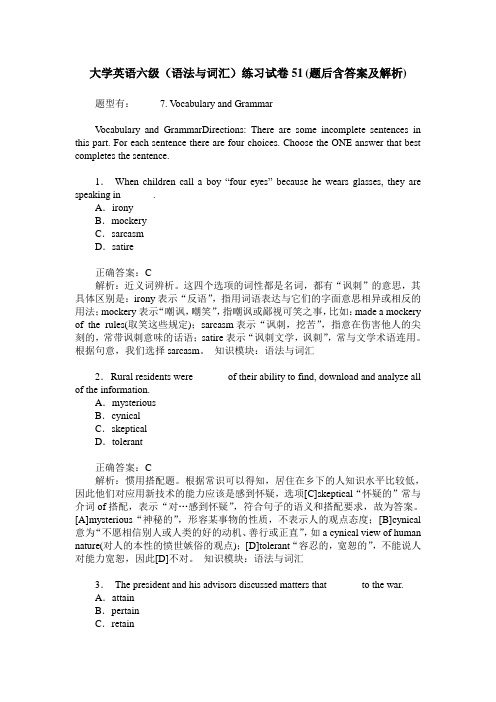
大学英语六级(语法与词汇)练习试卷51(题后含答案及解析)题型有:7. V ocabulary and GrammarV ocabulary and GrammarDirections: There are some incomplete sentences in this part. For each sentence there are four choices. Choose the ONE answer that best completes the sentence.1.When children call a boy “four eyes”because he wears glasses, they are speaking in ______.A.ironyB.mockeryC.sarcasmD.satire正确答案:C解析:近义词辨析。
这四个选项的词性都是名词,都有“讽刺”的意思,其具体区别是:irony表示“反语”,指用词语表达与它们的字面意思相异或相反的用法;mockery表示“嘲讽,嘲笑”,指嘲讽或鄙视可笑之事,比如:made a mockery of the rules(取笑这些规定);sarcasm表示“讽刺,挖苦”,指意在伤害他人的尖刻的,常带讽刺意味的话语;satire表示“讽刺文学,讽刺”,常与文学术语连用。
根据句意,我们选择sarcasm。
知识模块:语法与词汇2.Rural residents were ______ of their ability to find, download and analyze all of the information.A.mysteriousB.cynicalC.skepticalD.tolerant正确答案:C解析:惯用搭配题。
根据常识可以得知,居住在乡下的人知识水平比较低,因此他们对应用新技术的能力应该是感到怀疑,选项[C]skeptical“怀疑的”常与介词of搭配,表示“对…感到怀疑”,符合句子的语义和搭配要求,故为答案。
2016年6月山东省高中学业水平考试英语试题
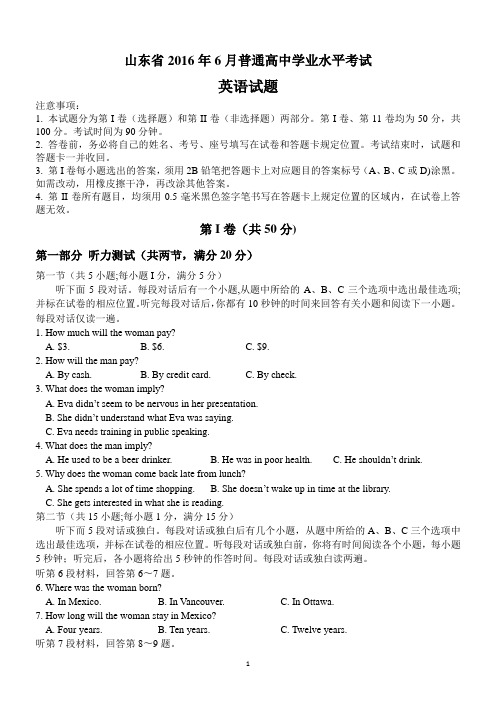
山东省2016年6月普通高中学业水平考试英语试题注意事项:1. 本试题分为第I卷(选择题)和第II卷(非选择题)两部分。
第I卷、第11卷均为50分,共100分。
考试时间为90分钟。
2. 答卷前,务必将自己的姓名、考号、座号填写在试卷和答题卡规定位置。
考试结束时,试题和答题卡一并收回。
3. 第I卷每小题选出的答案,须用2B铅笔把答题卡上对应题目的答案标号(A、B、C或D)涂黑。
如需改动,用橡皮擦干净,再改涂其他答案。
4. 第II卷所有题目,均须用0.5毫米黑色签字笔书写在答题卡上规定位置的区域内,在试卷上答题无效。
第I卷(共50分)第一部分听力测试(共两节,满分20分)第一节(共5小题;每小题I分,满分5分)听下面5段对话。
每段对话后有一个小题,从题中所给的A、B、C三个选项中选出最佳选项;并标在试卷的相应位置。
听完每段对话后,你都有10秒钟的时间来回答有关小题和阅读下一小题。
每段对话仅读一遍。
1. How much will the woman pay?A. $3.B. $6.C. $9.2. How will the man pay?A. By cash.B. By credit card.C. By check.3. What does the woman imply?A. Eva didn’t seem to be nervous in her presentation.B. She didn’t understand what Eva was saying.C. Eva needs training in public speaking.4. What does the man imply?A. He used to be a beer drinker.B. He was in poor health.C. He shouldn’t drink.5. Why does the woman come back late from lunch?A. She spends a lot of time shopping.B. She doesn’t wake up in time at the library.C. She gets interested in what she is reading.第二节(共15小题;每小题1分,满分15分)听下而5段对话或独白。
2016年6月英语六级真题和详细答案(第二套)
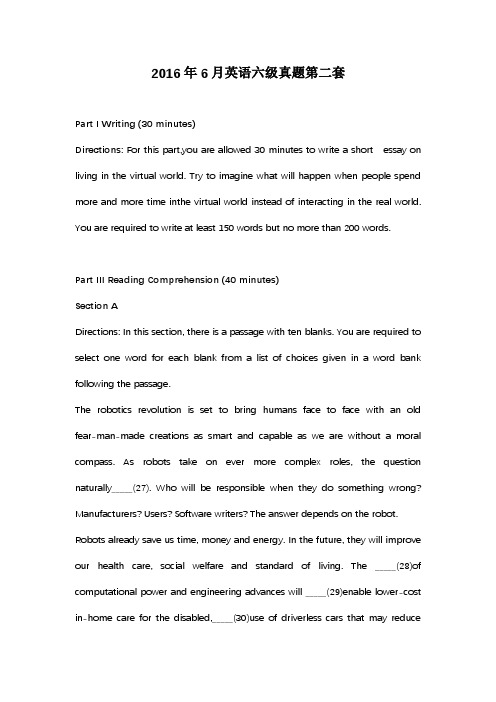
2016年6月英语六级真题第二套Part I Writing (30 minutes)Directions: For this part,you are allowed 30 minutes to write a short essay on living in the virtual world. Try to imagine what will happen when people spend more and more time inthe virtual world instead of interacting in the real world. You are required to write at least 150 words but no more than 200 words.Part III Reading Comprehension (40 minutes)Section ADirections: In this section, there is a passage with ten blanks. You are required to select one word for each blank from a list of choices given in a word bank following the passage.The robotics revolution is set to bring humans face to face with an old fear-man-made creations as smart and capable as we are without a moral compass. As robots take on ever more complex roles, the question naturally_____(27). Who will be responsible when they do something wrong? Manufacturers? Users? Software writers? The answer depends on the robot. Robots already save us time, money and energy. In the future, they will improve our health care, social welfare and standard of living. The _____(28)of computational power and engineering advances will _____(29)enable lower-cost in-home care for the disabled,_____(30)use of driverless cars that may reducedrunk and distracted-driving accidents and countless home and service-industry uses from street cleaning to food preparation.But there are _____(31)to be problems. Robot cars will crash. A drone (遥控飞行器)operator will _____(32)someone's privacy. A robotic lawn mower(割草机)will run over a neighbor's cat. Juries sympathetic to the _____(33)of machines will punish entrepreneurs with company-crushing _____(34)and damages What should government do to protect people while _____(35), space for innovation? Big. complicated systems on which much public safety depends, like driverless cars, should be built _____(36)and sold by manufacturers who take responsibility for ensuring safety and are liable for accidents. Governments should set safety requirements and then let insurers price the risk of the robots based on the manufacturer's driving record. not the passenger's.A.arisesB.ascendsC.boundbinationE.definiteF.eventuallyG.interfereH.invadeI.manifestingJ.penaltiesK.preservingL.programmedM.proximatelyN.victimsO.widespreadSection BDirections: In this section, you are going to read a passage with ten statements attached to it. Each statement contains information given in one of the paragraphs. Identify the paragraph from which the information is derived. You may choose a paragraph more than once. Each paragraph is marked with a letter. Answer the questions by marking the corresponding letter on Answer Sheet 2. Reform and Medical Costs[A]American are deeply concerned about the relentless rise in health care costs and health insurance premiums. They need to know if reform will help solve the problem. The answer is that no once has an easy fix rising medical costs. The fundamental fix—reshaping how care is delivered and how doctors are paid in a wasteful, abnormal system—is likely to be a achieved only through trial and incremental(渐进的)gains.[B]The good news is that a bill just approved by the House and a bill approved by the Senate Finance Committee would implement or test many reforms that should help slow the rise in medical costs over the long term. As report in TheNew England Journal of Medicine concluded. "Pretty much every proposed innovation found in the health policy Iiterature these days is contained in these measures."[C]Medical spending, which typically rises faster than wages and the overall economy, is propelled by two things: the high prices charged for medical services in this country and the volume of unnecessary care delivered by doctors and hospitals, which often perform a lot more tests and treatments than patient really needs.[D]Here are some of the important proposals in the House and Senate bills to try to address those problem, and why it is hard to know how well they will work. [E]Both bills would reduce the rate of growth in annual Medicare payments to hospital, nursing homes and other providers by amounts comparable to the productivity savings routinely made in other industries with the help of new technologies and new ways to organize work. This proposal could save Medicare more than $100 billion over the next decade. If private plans demanded similar productivity savings from providers, and refused to let providers shift additional costs to them, the savings could be much larger. Critics say Congress will give in to lobbyists and let inefficient provider off the hook(放过). That is far less likely to happen if Congress also adopts strong "pay-go" rules requiring that any increase in payments to providers be offset by new taxes or budge cuts.[F]The Senate Finance bill would impose an excise tax(消费税)on health insurance plans that cost more than $8,000 for an individual or $21,000 for afamily. It would most likely cause Insures to redesign plans to fall beneath the threshould. Enrollees would have to pay more money for many services out of their own pockets, and that would encourage them to think twice about whether an expensive or redundant test was worth it. Economists project that most employers would shift money from expensive health benefits into wages, The House bill has no similar tax. The final legislation should.[G]Any doctor who has wrestled with multiple forms from different insurers, or patients who have tried to understand their own parade of statements, know that simplification ought to save money. When the health insurance industry was still cooperating in reform efforts, its trade group offered to provide standardized forms for automated processing. It estimated that step would save hundreds of billions of dollars over the next decade. The bills would lock that pledge into law.[H]The stimulus package provided money to convert the inefficient, paper-driven medical system to electronic records that can be easily viewed and transmitted .This requires open investments to help doctors convert. In time it should help restrain costs by eliminating redundant test, preventing drug inter actions, and helping doctors find the best treatments.[I]Virtually all experts agree that the fee-for-service system—doctors are rewarded for that the cost of care is so high. Most agree that the solution is to push doctors to accept fixed payments to care for a particular illness or for a patient's needs over a year. No one knows how to make that happen quickly. The bills in both houses would start pilot projects within Medicare. They include suchmeasures as accountable care organizations to take charge of a patient's needs with an eye on both cost and quality, and chronic disease management to make sure the seriously ill, who are responsible for the bulk of all health care costs, are treated properly. For the most part, these experiments rely on incentive payments to get doctors to try them.[J]Testing innovations do no good unless the good experiments are identified and expanded and the bad ones arc dropped. The Senate bill would create an independent commission to monitor the pilot programs and recommend changes in Medicare's payment policies to urge providers to adopt reforms that work. The changes would have to be approved or rejected as a whole by Congress, making it hard for narrow-interest lobbies to bend lawmakers to their will.[K]The bills in both chambers would create health insurance exchanges on which small businesses and individuals could choose from an array of private plans and possibly a public option. All the plans would have to provide standard benefit packages that would be easy to compare. To get access to millions of new customers, insures would have a strong incentive to sell on the exchange. And the head-to-head competition might give them a strong incentive to lower their prices, perhaps by accepting slimmer profit margins or demanding better deals from providers.[L]The final legislation might throw a public plan into the competition, but thanks to the fierce opposition of the insurance industry and Republican critics, it mightnot save much money. The one in the House bill would have to negotiate rates with providers, rather than using Medicare rates, as many reformers wanted. [M]The president's stimulus package is pumping money into research to compare how well various treatments work. Is surgery, radiation or careful monitoring best for prostate(前列腺)cancer? Is the latest and most expensive cholesterol-lowering drug any better than its common competitors? The pending bills would spend additional money to accelerate this effort.[N]Critics have charged that this sensible idea would lead to rationing of care. (That would be true only if you believe that patients should have an unrestrained right to treatments proven to be inferior.) As a result, the bills do not requires, as they should, that the results of these studies be used to set payment rates in Medicare.[O]Congress needs to find the courage to allow Medicare to pay preferentially for treatments proven to be superior. Sometimes the best treatment might be the most expensive. But overall, we suspect that spending would come down through elimination of a lot of unnecessary or even dangerous tests and treatments.[P]The House bill would authorize the secretary of health and human services to negotiate drug prices in Medicare and Medicaid. Some authoritative analysts doubt that the secretary would get better deals than private insurers already get. We believe negotiation could work. It does in other countries.[Q] Missing from these bills is any serious attempt to rein in malpractice costs.Malpractice awards do drive up insurance premiums for doctors in high-risk specialties, and there is some evidence doctors engage in "defensive medicine" by performing tests and treatments primarily to prove they are not negligent should they get sued.36.With a tax imposed on expensive health insurance plans, most employers will likely transfer money from health expenses into wages.37.Changes in policy would be approved or rejected as a whole so that lobbyists would find it hard to influence lawmakers.'38.It is not easy to curb the rising medical costs in America.49.Standardization of forms for automatic processing will save a lot of medical 40.Republicans and insurance industry are strongly opposed to the creation of a public insurance plan.41.Conversion of paper to electronic medical records will help eliminate redundant tests and prevent drug interactions.42.The high cost of medical services and unnecessary tests and treatments have driven up medical expenses.43.One main factor that has driven up medical expenses is that doctors are compensated for the amount of care rather than its effect.44.Contrary to analysts' doubts, the author believes drug prices may be lowered through negotiation.45.Fair competition might create a strong incentive for insurers to charge less.Section CPassage OneQuestions 47 to 51 are based on the following passage.Facing water shortages and escalating fertilizer costs, farmers in developing countries are using raw sewage(下水道污水)to irrigate and fertilize nearly 49 million acres of cropland, according to a new report-and it may not be a bed thing.While the practice carries serious health risks for many, those dangers are outweighed by the social and economic gains for poor urban farmers and consumers who need affordable food."There is a large potential for wastewater agriculture to both help and hurt great numbers of urban consumers," said Liqa Raschid-Sally, who led the study.The report focused on poor urban areas, where farms in or near cities supply relatively inexpensive food. Most of these operations draw irrigation water from local rivers or lakes. Unlike developed cities, however, these areas lack advanced water-treatment facilities, and rivers effectively become sewers.(下水道)When this water is used for agricultural irrigation, farmers risk absorbing disease-causing XX, as do consumers who eat the produce raw and unwashed. Nearly 2.2 million people die a year because of diarrhea-related(与腹泻相关的)diseases, according to WHO statistics. XXX than 80% of those cases can be attributed to contant with contaminated water and a lack of XXX anitation. ButPay Drechsel, an environmental scientist, argues that the social and economic benefits of using untreated human waste to grow food outweigh the health risks. Those dangers can be addressed with farmer and consumer education, he said, while the free water and nutrients from human waste can help urban farmers in developing countries to escape poverty.Agriculture is a water-intensive business, accounting for nearly 70% of global fresh water consumption.In poor, dry regions, untreated wastewater is the only viable irrigation source to keep farmers in business. In some cases, water is so scarce that farmers break open sewage pipes transporting waste to local rivers.Irrigation is the primary agricultural use of human waste in the developing world. But frequently untreated human waste is used on grain crops, which are eventually cooked, minimizing the risk of transmitting water-borne diseases. With fertilizer prices jumping nearly 50% per metric ton over the last year in some places, human waste is an attractive, and often necessary, alternative.In cases where sewage mud is used, expensive chemical fertilizer us can be avoided. The mud contains the same critical nutrients."Overly strict standards often fail," James Bartram, a WHO water-health expert, said. "We need to accept that fact across much of the planet, so waste with little or no treatment will be used in agriculture for good reason."46.What does the author say about the use of raw sewage for farming?A.Its risks cannot be overestimated.B.It should be forbidden altogether.C.Its benefits outweigh the hazards involved.D.It is polluting millions of acres of cropland.47.What is the main problem caused by the use of wastewater for irrigation?A.Rivers and lakes nearby will gradually become contaminated.B.It will drive producers of chemical fertilizers out of business.C.Farmers and consumers may be affected by harmful bacteria.D.It will make the farm produce less competitive on the market.48.What is environmental scientist Pay Drechsel's attitude towards the use of untreated human waste in agriculture?A.Favorable.B.Indifferent.C.Skeptical.D.Responsible.49.What does Pay Dreschsel think of the risks involved in using untreated human waste for farming?A.They have been somewhat exaggerated.B.They can be dealt with through education.C.They will be minimized with new technology.D.They can be addressed by improved sanitation.50.What do we learn about James Bartram's position on the use of human wastefor farming?A.He echoes Pay Drechsel's opinion on the issue.B.He chaltenges Liqa Raschid-Sally's conclusionC.He thinks it the only way out of the current food erisis.D.He deems it indispensable for combating global poverty.Passage TwoThese days, nobody needs to cook. Families graze on high-cholesterol take-aways and microwaved ready-meals. Cooking is an occasional hobby and a vehicle for celebrity chefs. Which makes it odd that the kitchen has become the heart of the modern house, what the great hall was to the medieval castle, the kitchen is to the 21st-century home.The money spent on kitchens has risen with their status. In America the kitchen market is now worth $170 billion, five times the country's film industry. In the year to August 2007, IKEA, a Swedish furniture chain, sold over one million kitchens worldwide. The average budget for a "major" kitchen overhaul in 2006, calculates Remodeling magazing, was a staggering $54,000, even a "minor" improvement cost on average $18,000.Exclusivity, more familiar in the world of high fashion, has reached the kitchen: Robinson&Cornish, a British manufacturer of custom-made kitchens, offers a Georgian-style one which would cost £145,000-155,000—excluding building, plumbing and electrical work. Its big selling point is that nobody else will haveit :"You won't see this kitchen anywhere else in the word."The elevation of the room that once belonged only to the servants for the modem family tells the story of a century of social change. Right into the early 20th century, kitchens were smoky, noisy places, generally located underground, or to the back of the house, as far from living space as possible. That was as it should be: kitchens were for servants, and the aspiring middle classes wanted nothing to do with them.But as the working classes prospered and the servant shortage set in, housekeeping became a natter of interest to the educated classes. One of the pioneers of a radical new way of thinking about the kitchen was Catharine Esther Beecher, sister of Harriet Beecher Stowe. In American human's Home、published in 1869, the Beecher sisters recommended a scientific approach to use hold management, designed to enhance the efficiency of a woman's work and promote order. Many contemporary ideas about kitchen design can be traced back to another American, Chris Frederick, who set about enhancing the efficiency of the housewife. Her 1919 work, House-Engineering: Scientific Management in the Home, was based on detailed observation of a wife's daily routine. She borrowed the Principle of efficiency on the factory floor and applied mestic tasks on the kitchen floor.Frederick's central idea, that "stove,sink and kitchen table must be placed in such a relation that useless steps are avoided entirely". Inspired the first fully fitted kitchen, designed in the 1920s by Mangarete Schutter. Libotsky. It was amodernist triumph, and many elements remain central features of today's kitchen.51.What does the author say about the kitchen of today?A.It is where housewives display their cooking skills.B.It is where the family entertains important guests.C.It has become something odd in a modern house.D.It is regarded as the center of a modern home.52.Why does the Georgian-style kitchen sell at a very high price?A.It is believed to have tremendous artistic value.B.No duplicate is to be found in any other place.C.It is manufactured by a famous British company.D.No other manufacturer can produce anything like it.53.What does the change in the status of the kitchen reflect?A.Improved living conditions.B.Technological progress.C.Women's elevated status.D.Social change.54.What was the Beecher sisters' idea of a kichen?A.A place where women could work more efficiently.B.A place where high technology could be applied.C.A place of interest to the educated people.D.A place to experiment with new ideas.55.What do we learn about today's kitchen?A. It represents the rapid technological advance in people's daily life.B.Many of its central features are no different from those of the 1920s.C.It has been transformed beyond recognition.D.Many of its functions have changed greatly.Part IV Translation (30minutes)Directions: For this part, you are allowed 30 minutes to translate a passage from Chinese into English. You should write your answer on Answer Sheet 2.深圳是中国广东省一座新开发的城市。
大学英语六级(语法与词汇)练习试卷40(题后含答案及解析)

大学英语六级(语法与词汇)练习试卷40(题后含答案及解析) 题型有:7. V ocabulary and GrammarV ocabulary and GrammarDirections: There are some incomplete sentences in this part. For each sentence there are four choices. Choose the ONE answer that best completes the sentence.1.That matter is so ______ that it must not be discussed outside his office.A.confidentialB.confidentC.privateD.mysterious正确答案:A解析:形近义近词辨析。
confidential机密的,秘密的。
本题意为,那件事很秘密不能到这间办公室外去讨论。
private虽也有“秘密的”之意,但它强调的是个人的“秘密”,原句中讲对比“秘密”要进行讨论,可见它不可能是个人秘密,故选A。
知识模块:语法与词汇2.One of the most spectacular qualities of man is notably his ________to any kind of natural environment.A.inclinationB.dominationC.adaptabilityD.availability正确答案:C解析:名词辨义。
inclination意为“爱好,倾向,倾斜”,如:He has an inclination for hard work.(他有努力工作的意向。
)domination意为“支配,控制”,如:attempt to attain world domination(企图取得世界统治地位);adaptability意为“适应性,适合性,通融性”,如:The adaptability of youth to new surroundings is one of their good qualities.(年轻人适应新环境的能力是他们的一种优点。
2016年六年级学业水平测试综合试卷
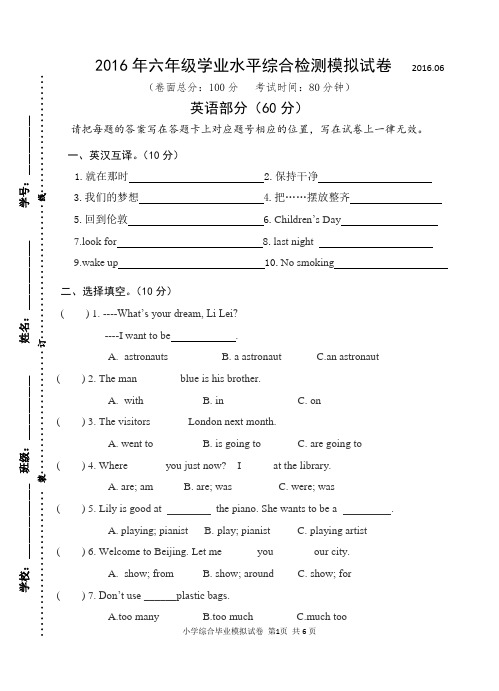
2016年六年级学业水平综合检测模拟试卷 2016.06(卷面总分:100分 考试时间:80分钟)英语部分(60分)请把每题的答案写在答题卡上对应题号相应的位置,写在试卷上一律无效。
一、英汉互译。
(10分)1.就在那时2.保持干净3.我们的梦想4.把……摆放整齐5.回到伦敦6.Children ’s Day7.look forst night9.wake up 10.No smoking 二、选择填空。
(10分)( ) 1. ----What’s your dream, Li Lei?----I want to be . A. astronautsB. a astronautC.an astronaut( ) 2. The man _______ blue is his brother.A. withB. inC. on( ) 3. The visitors ______ London next month.A. went toB. is going toC. are going to( ) 4. Where ______ you just now? I _____ at the library.A. are; amB. are; wasC. were; was( ) 5. Lily is good at the piano. She wants to be a .A. playing; pianistB. play; pianistC. playing artist( ) 6. Welcome to Beijing. Let me______ you _______our city.A. show; fromB. show; aroundC. show; for( ) 7. Don’t use ______plastic bags.A.too manyB.too muchC.much too学校:______________ 班级:____________ 姓名:_____________ 学号:___________ ......................... 装.......................订.........................线......................( ) 8. ---What ______she usually ______on Sundays ?---She watches TV. But last Sunday she _________ to the park with my friends.A. did, do, goesB. does, do, wentC. do, do, want( ) 9. The film was so _________ .We all liked it .A .excite B.excited C. exciting( ) 10. Walk into your bedroom _________. Your father is sleeping .A. quietB. quietlyC. loudly三、填空。
2016年英语六级真题及答案(共六套)
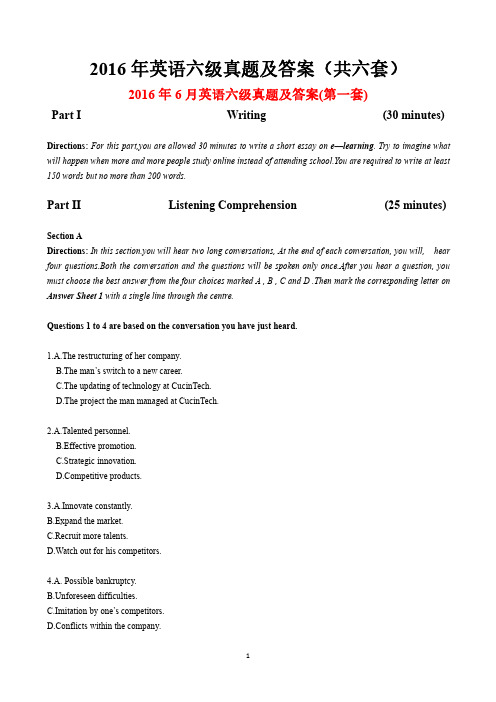
2016年英语六级真题及答案(共六套)2016年6月英语六级真题及答案(第一套)PartⅠWriting(30minutes)Directions:For this part,you are allowed30minutes to write a short essay on e—learning.Try to imagine what will happen when more and more people study online instead of attending school.You are required to write at least 150words but no more than200words.PartⅡListening Comprehension(25minutes) Section ADirections:In this section.you will hear two long conversations,At the end of each conversation,you will,hear four questions.Both the conversation and the questions will be spoken only once.After you hear a question,you must choose the best answer from the four choices marked A,B,C and D.Then mark the corresponding letter on Answer Sheet1with a single line through the centre.Questions1to4are based on the conversation you have just heard.1.A.The restructuring of her company.B.The man’s switch to a new career.C.The updating of technology at CucinTech.D.The project the man managed at CucinTech.2.A.Talented personnel.B.Effective promotion.C.Strategic innovation.petitive products.3.A.Innovate constantly.B.Expand the market.C.Recruit more talents.D.Watch out for his competitors.4.A.Possible bankruptcy.B.Unforeseen difficulties.C.Imitation by one’s competitors.D.Conflicts within the company.Questions5to8are based on the conversation you have just heard.5.A.The importance of language proficiency.B.The job of an interpreter.C.The stress felt by professionals.D.The best Way to effective communication.6.A.Admirable.B.Promising.C.Meaningful.D.Rewarding.7.A.They have all passed language proficiency tests.B.They have all studied cross.cultural differences.C.They all have a strong interest in language.D.They all have professional qualifications.8.A.It puts one’s long.term memory under more stress.B.It is more stressful than simultaneous interpreting.C.It attaches more importance to accuracy.D.It requires a much larger vocabulary.Section BDirections:In this section,you will hear two passages.At the end of each passage,you will hear three or four questions.Both the passage and the questions will be spoken only once.After you hear a question,you must choose the best answer from the four choices marked A,B,C and D.Then mark the corresponding letter on Answer Sheet1with a single line through the centre.Questions9to11are based on the passage you have just heard.9.A.It might increase mothers’mental distress.B.It might increase the risk of infants’death.C.It might affect mothers’health.D.It might disturb infants’sleep.10.A.Mothers who sleep with their babies need a little more sleep each night.B.Sleeping patterns of mothers greatly affect their newborn babies’health.C.Sleeping with infants in the same room has a negative impact on mothers.D.Mothers who breast.feed their babies have a harder time falling asleep.11.A.Take precautions to reduce the risk of sudden infant death syndrome.B.Sleep in the same house but not in the same room as their babies.C.Sleep in the same room but not in the same bed as their babies.D.Change their sleep patterns to adapt to their newborn babies’.Questions l2t015are based on the passage you have just heard.12.A.More money is needed to record the native languages in the US.B.The efforts to preserve Indian languages have proved fruitless.C.The US ranks first in the number of endangered languages.D.A lot of native languages have already died out in the US.13.A.To set up more language schools.B.To educate native American children.C.To revitalise America’s native languages.D.To document endangered languages.14.A.The US government’s policy of Americanising Indian children.B.The failure of American Indian languages to gain an official status.C.The long.time isolation of American Indians from the outside world.D.The US government’s unwillingness to spend money educating Indians.15.A.It is widely used in language immersion schools.B.It speeds up the extinction of native languages.C.It is being utilised to teach native languages.D.It tells traditional stories during family time.Section CDirections:In this section,you will hear three recordings of lectures or talks followed by three or four questions.The recordings Will be played only once.After you hear a question,you must choose the best answer from the four choices marked A,B,C and D.Then mark the corresponding letter on Answer Sheet l with a single line through the centre.Questions16to18are based on the recording you have just heard.16.A.It provides them with the basic necessities of everyday life.B.It pays their living expenses until they find employment again.C.It covers their mortgage payments and medical expenses for99weeks.D.It pays them up to half of their previous wages while they look for work.17.A.Convincing local lawmakers to extend unemployment benefits.B.Creating jobs for the huge army of unemployed workers.C.Providing training and guidance for unemployed workers.D.Raising funds to help those having no unemployment insurance.18.A.To encourage big businesses to hire back workers with government subsidies.B.To create more jobs by encouraging private investments in local companies.C.To allow them to postpone their monthly mortgage payments.D.To offer them loans they need to start their own businesses.Questions l9t022are based on the recording you have just heard.19.A.They investigated the ice.B.They analyzed the water content.C.They explored the ocean floor.D.They measured the depths of sea water.20.A.The ice decrease is more evident than previously thought.B.The ice ensures the survival of many endangered species.C.Most of the ice was accumulated over the past centuries.D.Eighty percent of the ice disappears in summer time.21.A.The melting Arctic ice has drowned many coastal cities.B.Arctic ice is a major source of the world’s flesh water.C.Arctic ice is essential to human survival.D.The decline of Arctic ice is irreversible.22.A.There is no easy technological solution to it.B.It will advance nuclear technology.C.There is no easy way.to understand it.D.It will do a lot of harm to mankind.Questions23t025are based on the recording you have just heard.23.A.The deciding factor in children’s academic performance.B.The health problems of children raised by a single parent.C.The relation between children’s self-control and their future success.D.The reason why New Zealand children seem to have better self-control.24.A.Those with a criminal record mostly come from single parent families.B.Children raised by single parents will have a hard time in their thirties.C.Parents must learn to exercise self-control in front of their children.ck of self-control in parents is a disadvantage for their children.25.A.Self-control problems will diminish as one grows up.B.Self-control can be improved through education.C.Self-control can improve one’s financial situation.D.Self-control problems may be detected early in children.PartⅢReading Comprehension(40minutes) Section ADirections:In this section.there is a passage with ten blanks.You are required to select one word for each blank from a list of choices given in a word bank following the passage.Read the passage through carefully before making your choices.Each choice in the bank is identified by a letter Please mark the corresponding letter for each item on Answer Sheet2with a single line through the centre.You may not use any of the words in the bank more than once.Questions26to35are based on the following passage.Let’s say you love roller-skating.Just the thought of26on your roller.skates brings a smile to your face.You also know that roller-skating is excellent exercise.You have a27attitude toward it.This description of roller-skating28the three components of an attitude:affect,cognition,and behavior.You love the activity;it's great fun.These feelings29the affective or emotional component;they are an important ingredient in attitudes.The knowledge we have about the object constitutes the cognitive component of an attitude.You understand the health30that the activity can bring.Finally,attitudes have a behavioral component.Our attitudes31us to go outside to enjoy roller—skating.Now.we don’t want t01eave you with the32that these three components always work together33.They don’t:sometimes they clash.For example,let’s say you love pizza(affective component);however,you have high cholesterol and understand(knowledge component)that eating pizza may be bad for your health.Which behavior will your attitude result in,eating pizza or34it?The answer depends off which component happens to be stronger.If you are walking past a pizza restaurant at lunchtime.Your emotions and feelings probably will be stronger than your knowledge that pizza may not be the best food for your health.In that instance.you have pizza for lunch.If you are at home trying to decide where to go for dinner,however,the knowledge component may35,and you decide to go where you can eat a healthier meal.A.avoidingB.benefitsC.highlightD.illustratesE.impressionF.improvesG.inquiringH.perfectly I.positiveJ.prevailK.primarily L.promptM.specifications N.strapping O.typicalSection BDirections:In this section.you are going to read a passage with ten statements attached to it.Each statement contains information given in one of the paragraphs.Identify the paragraph from which the information is derived You may choose a paragraph more than once.Each paragraph is marked with a letter.Answer the questions by marking the corresponding letter on Answer Sheet2.The Changing Generation[A]It turns out today’s teenagers aren’t so scary after all.Results of USA WEEKEND’s Teens&Parents survey reveal a generation of young people who get along well with their parents and approve of the way they’re being raised.They think of their parents with affection and respect.They speak with Mom or Dad when they have a problem.Most feel that their parents understand them.and they believe their family is the No.1priority in their parents’lives.Many even think their parents are cool!Although more than a third have an object in their rooms they would like to keep secret from their parents.rarely is it anything more alarming than a diary or off-color(低俗的)book or CD.[B]Such results may seem surprising against the background of shocking incidents that color the way the mass media portray the young.In October2000,the same month the survey was taken,the Washington.based Center for Media and Public Affairs wrote in its publication Media Monitor that,in a recent month of TV news coverage of American youth,just2%of teens were shown at home,and just1%were portrayed in a work setting.In contrast, the criminal justice system accounted for nearly one out of every lave visual backgrounds.No wonder parents worry their own kids might spin out of control once they hit the turbulent waters of adolescence.[C]The overall facts ought to reassure us.The survey shows us that today’s teens are affectionate.sensible and tar happier than the angry and tortured souls that have been painted for us by stereotypes.From other sources,we also know teenage crime,drug abuse and premarital sex are in general decline.We of course,need to pay attention to youngsters who are filled with discontent and hostility,but we should not allow these extreme cases to distort our view of most young people.[D]My own research at the Stanford Center on Adolescence uses in.depth interviews with small samples of youngsters rather than large‘scale surveys.Still,in my studies and others I have read,I find the same patterns as in USA WEEKEND’s survey.Today’s teenagers admire their parents and welcome parental guidance about important matters such as career choice—though certainly not Morn and Dad’s advice on matters of personal taste,such as music or fashion.When we ask teens to choose a hero,they usually select an older family member rather than a remote public figure.Most teens say they enjoy the company of both parents and friends.[E]Contrary to some stereotypes,most adolescents believe they must be tolerant of differences among individuals(though they do not always find this easy in the cliquish(拉帮结派的)environment of high school).Many of them volunteer for community service with disadvantaged people.One prevalent quality we have round in teens’statements about themselves,their friends and their families is a strikingly positive emotional tone.By and large,these are very nice kids,and as the band The Who used to sing,“The kids are alright.”[F]How much is today’s sprat of harmony a change from our more turbulent past?A mere generation ago,parent。
2016年中学考试英语真题及问题详解
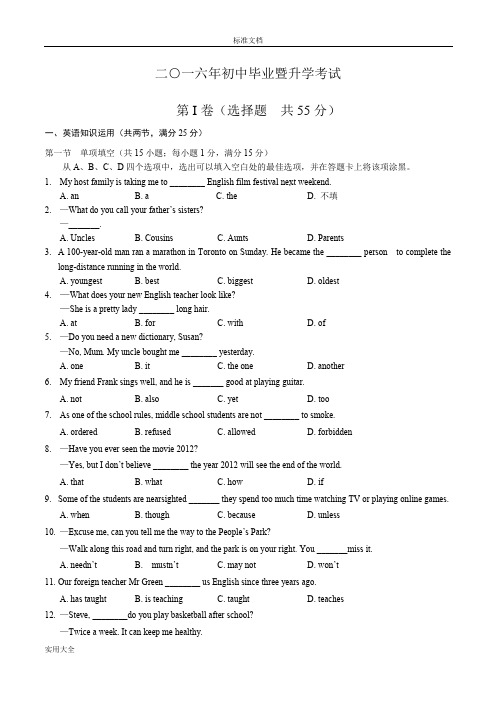
二○一六年初中毕业暨升学考试第I卷(选择题共55分)一、英语知识运用(共两节,满分25分)第一节单项填空(共15小题;每小题1分,满分15分)从A、B、C、D四个选项中,选出可以填入空白处的最佳选项,并在答题卡上将该项涂黑。
1. My host family is taking me to ________ English film festival next weekend.A. anB. aC. theD. 不填2. —What do you call your father’s sisters?—_______.A. UnclesB. CousinsC. AuntsD. Parents3. A 100-year-old man ran a marathon in Toronto on Sunday. He became the ________ person to complete thelong-distance running in the world.A. youngestB. bestC. biggestD. oldest4. —What does your new English teacher look like?—She is a pretty lady ________ long hair.A. atB. forC. withD. of5. —Do you need a new dictionary, Susan?—No, Mum. My uncle bought me ________ yesterday.A. oneB. itC. the oneD. another6. My friend Frank sings well, and he is _______ good at playing guitar.A. notB. alsoC. yetD. too7. As one of the school rules, middle school students are not ________ to smoke.A. orderedB. refusedC. allowedD. forbidden8. —Have you ever seen the movie 2012?—Yes, but I don’t believe ________ the year 2012 will see the end of the world.A. thatB. whatC. howD. if9. Some of the students are nearsighted _______ they spend too much time watching TV or playing online games.A. whenB. thoughC. becauseD. unless10. —Excuse me, can you tell me the way to the People’s Park?—Walk along this road and turn right, and the park is on your right. You _______miss it.A. needn’tB. mustn’tC. may notD. won’t11. Our foreign teacher Mr Green ________ us English since three years ago.A. has taughtB. is teachingC. taughtD. teaches12. —Steve, ________do you play basketball after school?—Twice a week. It can keep me healthy.A. how farB. how soonC. how longD. how often13. Whenever I see the birds, I’ll _______ flying in the sky.A. think upB. dream ofC. work onD. pick up14. Welcome to our school, ladies and gentlemen. ________, I’d like to introduce myself.A. To be honestB. To my surpriseC. To start withD. To tell you the truth15. Which of the following sig ns means “N o climbing”?A B C D第二节完形填空(共10小题;每小题1分,满分10分)阅读下面短文,掌握其大意,然后从16~25各小题所给的四个选项(A、B、C和D)中,选出最佳选项,并在答题卡上将该项涂黑。
2016年6月英语六级考试真题试卷附答案和解析

2016年6月英语六级考试真题试卷附答案和解析(第1套) Directions: There are 2 passages in this section. Each passage is followed by some questions or unfinished statements. For each of them there are four choices marked A. , B. , C. and D.. You should decide on the best choice and mark the corresponding letter on Answer sheet with a single line through the centre.Passage OneQuestions 46 to 50 are based on the following passage.Manufacturers of products that claim to be environmentally friendly will face tighter rules on how they are advertised to consumers under changes proposed by the Federal Trade Commission.The commission's revised "Green Guides" warn marketers against using labels that make broad claims, like "eco-friendly". Marketers must qualify their claims on the product packaging and limit them to a specific benefit, such as how much of the product is recycled."This is really about trying to cut through the confusion that consumers have when they are buying a product and that businesses have when they are selling a product," said Jon Leibowitz, chairman of the commission.The revisions come at a time when green marketing is on the rise. According to a new study, the number of advertisements with green messages in mainstream magazines has risen since 1987, and peaked in 2008 at 10.4%. In 2009, the number dropped to 9%.But while the number of advertisements may have dipped, there has been a rapid spread of ecolabeling. There are both good and bad players in the eco-labeling game.In the last five years or so, there has been an explosion of green claims and environmental claims. It is clear that consumers don't always know what they are getting.A handful of lawsuits have been filed in recent years against companies accused of using misleading environmental labels. In 2008 and 2009, class-action lawsuits (集体诉讼) were filed against SC Johnson for using "Greenlist" labels on its cleaning products. The lawsuits said that the label was misleading because it gave the impression that the products had been certified by a third party when the certification was the company's own."We are very proud of our accomplishments under the Greenlist system and we believe that we will prevail in these cases," Christopher Beard, director of public affairs for SC Johnson, said, while acknowledging that "this has been an area that is difficult to navigate."Companies have also taken it upon themselves to contest each other's green claims.David Mallen, associate director of the Council of Better Business Bureau, said inthe last two years the organization had seen an increase in the number of claims companies were bringing against each other for false or misleading environmental product claims."About once a week, I have a client that will bring up a new certification I've never even heard of and I'm in this industry, said Kevin Wilhelm, chief executive officer of Sustainable Business Consulting. "It's kind of a Wild West, anybody can claim themselves to be green." Mr. Wilhelm said the excess of labels made it difficult for businesses and consumers to know which labels they should pay attention to.46. What do the revised "Green Guides" require businesses to do?A) Manufacture as many green products as possible.B) Indicate whether their products are recyclable.C) Specify in what way their products are green.D) Attach green labels to all of their products.47. What does the author say about consumers facing an explosion of green claims?A) They can easily see through the businesses' tricks.B) They have to spend lots of time choosing products.C) They have doubt about current green certification.D) They are not clear which products are truly green.48. What was SC Johnson accused of in the class-action lawsuits?A) It gave consumers the impression that all its products were truly green.B) It gave a third party the authority to label its products as environmentally friendly.C) It misled consumers to believe that its products had been certified by a third party.D) It sold cleaning products that were not included in the official "Greenlist".49. How did Christopher Beard defend his company's labeling practice?A) There were no clear guidelines concerning green labeling.B) His company's products had been well received by the public.C) It was in conformity to the prevailing practice in the market.D) No law required the involvement of a third party in certification.50. What does Kevin Wilhelm imply by saying "It's kind of a Wild West" (Line 3,Para. 11)?A) Businesses compete to produce green products.B) Each business acts its own way in green labeling.C) Consumers grow wild with products labeled green.D) Anything produced in the West can be labeled green.Passage TwoQuestions 51 to 55 are based on the following passage.America's education system has become less a ladder of opportunity than a structure to transmit inequality from one generation to the next.That's why school reform is so critical. This is an issue of equality, opportunity and national conscience. It's not just about education, but about poverty and justice.It's true that the main reason inner-city schools do poorly isn't teachers' unions, but poverty. Southern states without strong teachers' ,unions have schools at least as awful as those in union states. Some Chicago teachers seem to think that they shouldn't be held accountable until poverty is solved. There're steps we can take that would make some difference, and Mayor Rahm Emanuel is trying some of them—yet the union is resisting.I'd be sympathetic if the union focused solely on higher compensation. Teachers need to be much better paid to attract the best college graduates to the nation's worst schools. But, instead, the Chicago union seems to be using its political capital primarily to protect weak performers.There's solid evidence that there are huge differences in the effectiveness of teachers. The gold standard study by Harvard and Columbia University scholars found that even in high-poverty schools, teachers consistently had a huge positive or negative impact.Get a bottom 1% teacher, and the effect is the same as if a child misses 40% of the school year. Get a teacher from the top 20%, and it's as if a child has gone to school for an extra month or two.The study found that strong teachers in the fourth through eighth grades raised the skills of their students in ways that would last for decades. Just having a strong teacher for one elementary year left pupils a bit less likely to become mothers as teenagers, a bit more likely to go to college and earning more money at age 28.How does one figure out who is a weak teacher? Yes, that's a challenge. But researchers are improving systems to measure a teacher's performance throughout the year, and, with three years of data, ifs usually possible to tell which teachers are failing.Unfortunately, the union in Chicago is insisting that teachers who are laid off—often for being ineffective—should get priority in new hiring. That's an insult to students.Teaching is so important that it should be like other professions, with high pay and good working conditions but few job protections for bottom performers. This isn't a battle between garment workers and greedy bosses. The central figures in the Chicago schools strike are neither strikers nor managers but 350,000 children. Protecting the union demand sacrifices those students, in effect turning a blind eye to the injustice in the education system.51. What do we learn about America's education system?A) It provides a ladder of opportunity for the wealthy.B) It contributes little to the elimination of inequality.C) It has remained basically unchanged for generations.D) It has brought up generations of responsible citizens.52. What is chiefly responsible for the undesirable performance of inner-city schools?A) Unqualified teachers. C) Unfavorable learning environment.B) Lack of financial resources. D) Subconscious racial discrimination.53. What does the author think the union should do to win popular support?A) Assist the city government in reforming schools. C) Demand higher pay for teachers.B) Give constructive advice to inner-city schools. D) Help teachers improve teaching.54. What is the finding of the gold standard study by Harvard and Columbia University scholars?A) Many inner-city school teachers are not equal to their jobs.B) A large proportion of inner-city children often miss classes.C) Many students are dissatisfied with their teachers.D) Student performance has a lot to do with teachers.55. Why does the author say the Chicago unions demand is an insult to students?A) It protects incompetent teachers at the expense of students.B) It underestimates students, ability to tell good teachers from poor ones.C) It makes students feel that they are discriminated against in many ways.D) It totally ignores students,initiative in the learning process.答案:46 [C]【定位】根据题干中的the revised “Green Guides”定位至第2 段。
2016年六月英语六级真题和答案word文档
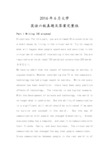
2016年6月大学英语六级真题及答案完整版Part I Writing (30 minutes)Directions: For this part, you are allowed 30 minutes to write a short essay on living in the virtual world. Try to imagine what will happen when people spend more and more time in the virtual world instead of interacting in the real world. You are required to write at least 150 words but no more than 200 words. 参考范文1:We have to admit that the impact of technology on society is unquestionable. Whether considering the TV or the computers. technology has had a huge impact on society。
While not every advance has been beneficial. there have been many positive effects of technology。
The internet is one typical example, With the development of science and technology. the world is no longer what it used to be。
But the ability of communication is a significant skill which should be cultivated if we want to survive and succeed in the world。
大学英语六级(语法与词汇)练习试卷23(题后含答案及解析)
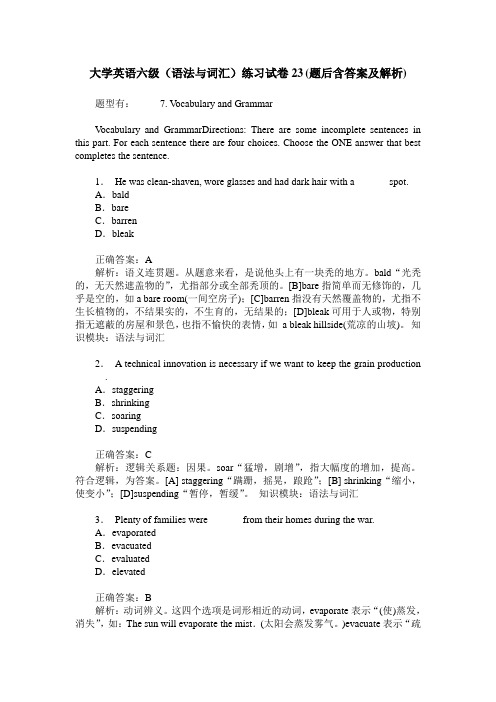
大学英语六级(语法与词汇)练习试卷23(题后含答案及解析)题型有:7. V ocabulary and GrammarV ocabulary and GrammarDirections: There are some incomplete sentences in this part. For each sentence there are four choices. Choose the ONE answer that best completes the sentence.1.He was clean-shaven, wore glasses and had dark hair with a ______ spot.A.baldB.bareC.barrenD.bleak正确答案:A解析:语义连贯题。
从题意来看,是说他头上有一块秃的地方。
bald“光秃的,无天然遮盖物的”,尤指部分或全部秃顶的。
[B]bare指简单而无修饰的,几乎是空的,如a bare room(一间空房子);[C]barren指没有天然覆盖物的,尤指不生长植物的,不结果实的,不生育的,无结果的;[D]bleak可用于人或物,特别指无遮蔽的房屋和景色,也指不愉快的表情,如 a bleak hillside(荒凉的山坡)。
知识模块:语法与词汇2.A technical innovation is necessary if we want to keep the grain production ______.A.staggeringB.shrinkingC.soaringD.suspending正确答案:C解析:逻辑关系题:因果。
soar“猛增,剧增”,指大幅度的增加,提高。
符合逻辑,为答案。
[A] staggering“蹒跚,摇晃,踉跄”;[B] shrinking“缩小,使变小”;[D]suspending“暂停,暂缓”。
知识模块:语法与词汇3.Plenty of families were ______ from their homes during the war.A.evaporatedB.evacuatedC.evaluatedD.elevated正确答案:B解析:动词辨义。
大学英语六级(语法与词汇)练习试卷68(题后含答案及解析)

大学英语六级(语法与词汇)练习试卷68(题后含答案及解析)题型有:7. V ocabulary and GrammarV ocabulary and GrammarDirections: There are some incomplete sentences in this part. For each sentence there are four choices. Choose the ONE answer that best completes the sentence.1.He soon made a ______ for himself on the stage.A.popularityB.fameC.prominenceD.reputation正确答案:D解析:固定搭配。
make a reputation for oneself固定用法,意为“为自己博得名声。
”知识模块:语法与词汇2.Jane buys all the fashion magazines, and she always tries to dress in ______ with the latest style.A.confirmationB.proposalC.conformityD.variation正确答案:C解析:名词辨义。
这四个选项都是名词,confirmation表示“证实,确认;批准”;proposal表示“提议,建议”;conformity意指“一致,符合”;variation 表示“变更,变化,变异,变种”。
根据句意,她买时装杂志的目的就是跟上潮流的发展,所以C)项符合题目要求。
知识模块:语法与词汇3.The two things are the same in outward form but different ________.A.in additionB.in briefC.in commonD.in essence正确答案:D解析:短语辨析。
大学英语六级(语法与词汇)练习试卷46(题后含答案及解析)
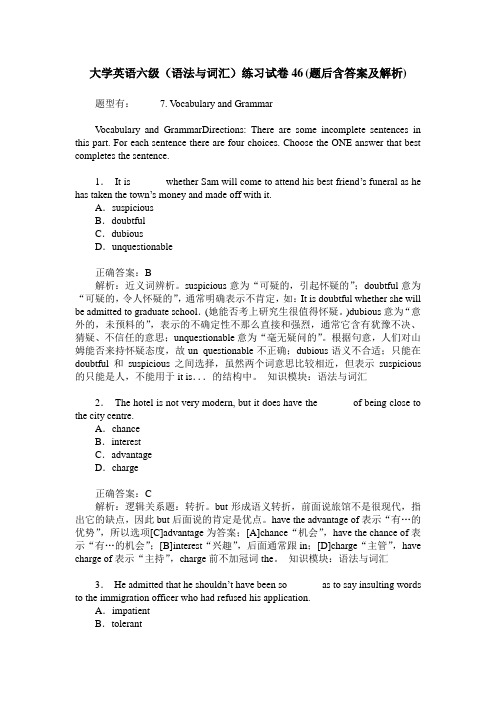
大学英语六级(语法与词汇)练习试卷46(题后含答案及解析) 题型有:7. V ocabulary and GrammarV ocabulary and GrammarDirections: There are some incomplete sentences in this part. For each sentence there are four choices. Choose the ONE answer that best completes the sentence.1.It is ______ whether Sam will come to attend his best friend’s funeral as he has taken the town’s money and made off with it.A.suspiciousB.doubtfulC.dubiousD.unquestionable正确答案:B解析:近义词辨析。
suspicious意为“可疑的,引起怀疑的”;doubtful意为“可疑的,令人怀疑的”,通常明确表示不肯定,如:It is doubtful whether she will be admitted to graduate school.(她能否考上研究生很值得怀疑。
)dubious意为“意外的,未预料的”,表示的不确定性不那么直接和强烈,通常它含有犹豫不决、猜疑、不信任的意思;unquestionable意为“毫无疑问的”。
根据句意,人们对山姆能否来持怀疑态度,故un questionable不正确;dubious语义不合适;只能在doubtful和suspicious之间选择,虽然两个词意思比较相近,但表示suspicious 的只能是人,不能用于it is...的结构中。
知识模块:语法与词汇2.The hotel is not very modern, but it does have the ______ of being close to the city centre.A.chanceB.interestC.advantageD.charge正确答案:C解析:逻辑关系题:转折。
大学英语六级(语法与词汇)练习试卷180(题后含答案及解析)
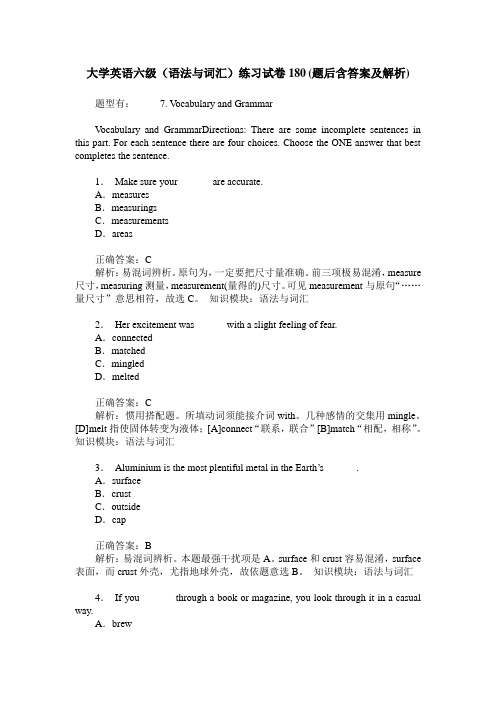
大学英语六级(语法与词汇)练习试卷180(题后含答案及解析) 题型有:7. V ocabulary and GrammarV ocabulary and GrammarDirections: There are some incomplete sentences in this part. For each sentence there are four choices. Choose the ONE answer that best completes the sentence.1.Make sure your ______ are accurate.A.measuresB.measuringsC.measurementsD.areas正确答案:C解析:易混词辨析。
原句为,一定要把尺寸量准确。
前三项极易混淆,measure 尺寸,measuring测量,measurement(量得的)尺寸。
可见measurement与原句“……量尺寸”意思相符,故选C。
知识模块:语法与词汇2.Her excitement was ______with a slight feeling of fear.A.connectedB.matchedC.mingledD.melted正确答案:C解析:惯用搭配题。
所填动词须能接介词with。
几种感情的交集用mingle。
[D]melt指使固体转变为液体;[A]connect“联系,联合”[B]match“相配,相称”。
知识模块:语法与词汇3.Aluminium is the most plentiful metal in the Earth’s ______.A.surfaceB.crustC.outsideD.cap正确答案:B解析:易混词辨析。
本题最强干扰项是A。
surface和crust容易混淆,surface 表面,而crust外壳,尤指地球外壳,故依题意选B。
2016年华强中心六年级毕业学业水平监测英语试卷有答案AwHlnP
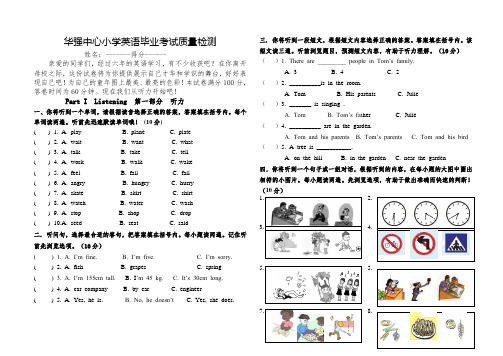
华强中心小学英语毕业考试质量检测姓名:-------得分------亲爱的同学们,经过六年的英语学习,有不少收获吧?在你离开母校之际,这份试卷将为你提供展示自己才华和学识的舞台,好好表现自己吧!为自己的童年图上最美、最亮的色彩!本试卷满分100分,答卷时间为60分钟。
现在我们从听力开始吧!Part I Listening第一部分听力一、你将听到一个单词,请根据读音选择正确的答案,答案填在括号内。
每个单词读两遍。
听前先迅速默读单词哦!(10分)( ) 1. A. play B. plane C. plate( ) 2. A. wait B. want C. what( ) 3. A. talk B. take C. tell( ) 4. A. work B. walk C. wake( ) 5. A. feel B. fall C. fail( ) 6. A. angry B. hungry C. hurry( ) 7. A. skate B. skirt C. shirt( ) 8. A. watch B. water C. wash( ) 9. A. stop B. shop C. drop( ) 10.A. seed B. seat C. said二.听问句,选择最合适的答句,把答案填在括号内。
每小题读两遍。
记住听前先浏览选项。
(10分)( ) 1. A. I’m fine. B. I’m five. C. I’m sorry. ( ) 2. A. fish B. grapes C. spring( ) 3. A. I’m 155cm tall. B. I’m 45 kg. C. It’s 30cm long.( ) 4. A. car company B. by car C. engineer( ) 5. A. Yes, he is. B. No, he doesn’t C. Yes, she does. 三. 你将听到一段短文,根据短文内容选择正确的答案。
2016年山东省高中学业水平考试英语试题
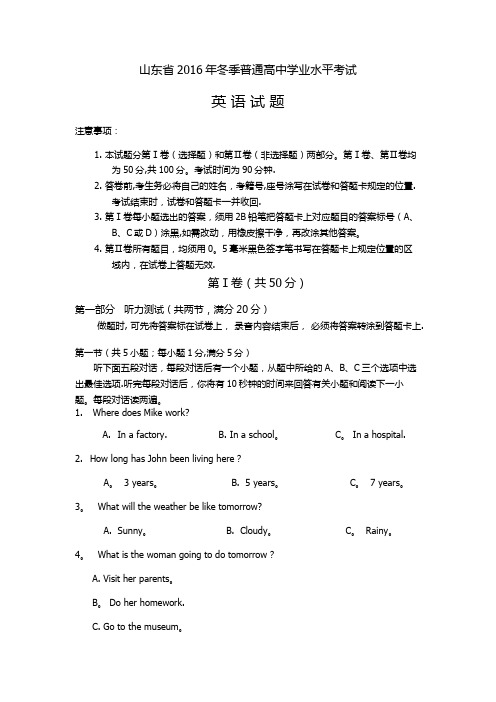
山东省2016年冬季普通高中学业水平考试英语试题注意事项:1.本试题分第Ⅰ卷(选择题)和第Ⅱ卷(非选择题)两部分。
第Ⅰ卷、第Ⅱ卷均为50分,共100分。
考试时间为90分钟.2.答卷前,考生务必将自己的姓名,考籍号,座号涂写在试卷和答题卡规定的位置.考试结束时,试卷和答题卡一并收回.3.第Ⅰ卷每小题选出的答案,须用2B铅笔把答题卡上对应题目的答案标号(A、B、C或D)涂黑,如需改动,用橡皮擦干净,再改涂其他答案。
4.第Ⅱ卷所有题目,均须用0。
5毫米黑色签字笔书写在答题卡上规定位置的区域内,在试卷上答题无效.第Ⅰ卷(共50分)第一部分听力测试(共两节,满分20分)做题时, 可先将答案标在试卷上,录音内容结束后,必须将答案转涂到答题卡上.第一节(共5小题;每小题1分,满分5分)听下面五段对话,每段对话后有一个小题,从题中所给的A、B、C三个选项中选出最佳选项.听完每段对话后,你将有10秒钟的时间来回答有关小题和阅读下一小题。
每段对话读两遍。
1. Where does Mike work?A.In a factory.B. In a school。
C。
In a hospital.2.How long has John been living here?A。
3 years。
B. 5 years。
C。
7 years。
3。
What will the weather be like tomorrow?A. Sunny。
B. Cloudy。
C。
Rainy。
4。
What is the woman going to do tomorrow?A. Visit her parents。
B。
Do her homework.C. Go to the museum。
英语试题第1页(共8页)5. What time is it now?A。
5:00。
B. 5:30。
C。
6:00。
第二节(共15小题;每小题1分,满分15分)听下面三段对话和一段独白.每段对话和独白后有几个小题,从题中所给的A、B、C 三个选项中选出最佳选项。
- 1、下载文档前请自行甄别文档内容的完整性,平台不提供额外的编辑、内容补充、找答案等附加服务。
- 2、"仅部分预览"的文档,不可在线预览部分如存在完整性等问题,可反馈申请退款(可完整预览的文档不适用该条件!)。
- 3、如文档侵犯您的权益,请联系客服反馈,我们会尽快为您处理(人工客服工作时间:9:00-18:30)。
2016年学业水平测试模拟试卷(一)26. --- ___________---I paid twelve pounds altogether for the bill.A. How much did you pay?B. How much does it cost?C. How many did yu pay?D. How much does it take?27. --- ________ you ________ the movie Transformers ?--- Yes , I have . I saw it last night.A. Did ; seeB. Have; seenC. Do; seeD. Had; seen28. --- When do you play football?--- ______________A. On weekendsB. On the playgroundC. Once a weekD. With my classmates29. The second Youth Olympic Games _____ in Nanjing in August , 2014.A. heldB. was heldC. holdD. is hold30. --- You’re so good a dancer. Are you interested in dancing?---Of course. I _____ a member of the dancing club at school.A. use to beB. am used to beC. used to beD. used to do31. ______ exciting event it is! That really rocked!A. WhatB. HowC. What anD. How an32. --- I’m happy to meet so many Chinese here!---Yes. ______ of the students in this school are from China.A. One thirdB. First threeC. One threeD. First third33. Here are some tips _____ what to wear _____ your first day at your internship.A. of; inB. on; inC. with; atD. on; on34. ---May I ask about my ______?---Sure. 1,500 yuan a month. After three months , you’ll get 2,000 yuan a month.A. work hoursB. dutyC. salaryD. workplace35. ---I like playing basketball very much.---_______ . He often plays basketball after school.A. So do my brotherB. So does my brotherC. Neither does my brotherD. Nor does my brother36. ---Have you ever been to Lijiang?---Yes. I think Lijiang is _____ city in China.A. the beautifulB. the more beautifulC. the most beautifulD. most beautiful37. ---I _____ play the piano when I was only five years old.---Oh, you are really good.A. canB. couldC. can’tD. couldn’t38. English is spoken in many countries, _____ Britain, America and Canada.A. such asB. such forC. includeD. and39. ---Did Betty tell you ______?---No, she didn’t.A. why did she go to BeijingB. when she go to BeijingC. how she went to BeijingD. what she goes to Beijing40. When the house is on fire, you should stay ______ and tell the operator your name andaddress.A. shyB. calmC. worriedD. frightened41. Many jobs require you _____ a uniform and tie long hair _______.A. put on; upB. wearing; onC. to wear; upD. put on; on42. ---What ______ John ______?---He is tall and thin.A. has; lookedB. does; likeC. is ; look likeD. does; look like43. Mike is among the top three interns in the hotel. He ______ finishes his work on time.A. alwaysB. sometimesC. seldomD. never44. Don’t forget _____ the door when you leave the classroom.A. closeB. to closeC. closingD. opening45. ---________ the guests ______ back, please let me know at once.---Yes, sir.A. As ; comeB. If; will comeC. If ; comeD. As ; came模拟试卷(二)26. ---Hi, Tom, I’ve left my schoolbag at home.---Don’t worry. I’ll _______ it for you.A. bringB. takeC. fetchD. carry27. We should _____ ourselves to the new environment.A. suitB. matchC. fitD. adapt28. When I took his temperature, it was two degrees above _______ .A. usualB. ordinaryC. commonD. normal29. Last year I _____ the 100-meter race and won second place.A. attendedB. took part inC. joinedD. join in30. Billy seems more _____ than Sally.A. friendlyB. patientlyC. politelyD. carefully31. ---How does your brother _____ his pocket money?---He spends part of his money on computer games , then _____ the rest in the bank.A. deal with; save upB. deal with; put upC. do with ; save upD. do with; put up32. My family trip was _____ because of the bad weather.A. called offB. called forC. called upD. called on33. The teacher might not come this evening. _____ , we won’t hold the party.A. In caseB. In any caseC. In that caseD. In no case34. Thank you for your offer , but I can manage it ______ .Which of the following is wrong?A. on my ownB. myselfC. of my ownD. by myself35. It is _____ for Billy to get an “A” in the English test.A. possibleB. probableC. possiblyD. likely36. The painting is ______ . You should not have sold it at such a low price.A. great valueB. of great valueC. of great valuableD. very value37. ---I’ve never found a better job.--- _________.A. I don’t like itB. Never mind.C. Too bad.D. Congratulations.38. ---There are only 5 minutes until class starts.---Don’t worry. I think I will __________ .A. reach itB. finish itC. get itD. make it39. ---Hey, Sally. What’s the matter with your brother?---He _______ happy, because there _______ any presents for him.A. was; weren’tB. wasn’t; wereC. wasn’t; weren’tD. was; were40. Is it three hours _____ it takes the boy to come to school on foot?A. thatB. whichC. whenD. what41. ---Could I come here again tomorrow?---Yes, you ____________ .A. couldB. mustC. canD. should42. I saw him _____ behind the tree thinking.A. satB. seatedC. seatingD. seat43. ---Could you be so kind as to close the window?--- ___________A. With pleasure.B. Go ahead.C. It’s my pleasure.D. That’s OK.44. ---Mum , shall we watch Voice of China together this evening?--- ____________A. Not at all.B. You’re welcome.C. Never mind.D. I t’s a good idea.45. The doctor did all he could _____ the patient’s life.A. saveB. to saveC. savingD. saved模拟试卷(三)26. --- _____________---I’m fine.A. How are you?B. How do you do?C. May I help you?D. What’s the weather like?27. ---How’s the training going?--- _____________A. OK.B.In the training centre.C. Pretty good.D. That’s all right.28. --- ______ have you studied English?---For nine years. I started when I was nine years old.A. How oftenB. How muchC. How soonD. How long29. ---Is it heavy?---No. It’s as _____ as a book.A. heavyB. heavierC. lightD. lighter30. ---I’m going to have an important interview today.---Well, I’m sure you’ll do well.---But I don’t know __________ .A. how to sayB. what to sayC. to say whatD. to say how31. Let’s go shopping online, ____________?A. will youB. can youC. shall weD. won’t you32. ---Did Sally leave a message?---Yes. She wanted to know _____ go shopping with her.A. whether would youB. that you willC. when will youD. if you would33. ---Sally is a good student.--- ___________ , and _____________ .A. So she is; so you areB. So she is; so are youC. So is she; so are youD. So is she; so you are34. ---Do you know the girl _____ is in a red dress over there?---Yes. She is my classmate, Sally.A. whoB. whichC. /D. whom35. ---Mum, need I leave for Suqian?--- ____________A. No, you mustn’t.B. No, you don’t.C. Yes, you need.D. Yes, you must.36. ---The washing machine in my room doesn’t work.---I will have someone _____ it for you.A. repairB. repairingC. repairedD. to repair37. ---What did Sally give you last night?---It was the book _____ I lent her last week.A. whatB. whichC. thatD. who38. Something is wrong with my keyboard. Could I use ______?A. myselfB. yourC. youD. yours39. ---I want to stay young forever.---What can you do to _____ that you will always stay young?A. proveB. ensureC. protectD. keep40. To solve such a difficult problem is _____ the little child.A. much too forB. much too toC. too much toD. too much for41. Only in this way _____ realize your dream.A. you canB. you can be able toC. can youD. can you be able to42. ---Do you mind if I smoke here?---_____ Go to the smoking room, please.A. Of course not.B. Yes, I do.C. No, I don’t.D. Yes, I don’t.43. You’d better not ask her for help. She will not try her best _____ she agrees to help you.A. althoughB. even ifC. becauseD. even so44. My new dress cost me ______ the last one that I bought.A. three times thanB. three times as much asC. three times as many asD. as three times much as45. It is no use _____ with a man like him.A. being arguedB. arguedC. arguingD. argues模拟试卷(四)26. ---What’s your plan for the coming May Day?---I have no idea now. I’m too busy to take _____ holiday at _____ present.A. a; anB. a; aC. the; theD. a; /27. ---Which course do you like _____ , English or Chinese?---I prefer English.A. bestB. betterC. moreD. most28. If she _____ back, I ________ you.A. comes; will tellB. came; toldC. will come; will tellD. comes; tell29. Sally likes _____ friends face to face.A. chatting withB. chatting toC. chatting onD. chatting of30. May Day is coming . We’ll _____ three days _____ .A. turn; offB. see; offC. rest; offD. have; off31. Sally bought a _____ mobile phone yesterday, for it’s cheaper.A. usingB. usedC. usefulD. useless32. The cup is _____ hot water and the boy wants to have some.A. filled withB. fill withC. fulled ofD. full with33. When the bus _____ at the station, please call me.A. reachesB. arrivesC. getsD. moves34. ________ good time we had at the dinner party!A. WhatB. What aC. HowD. How a35. Is this the factory ______ you visited two years ago?A. thatB. whereC. in whichD. who36. Can I ______ smoke here?A. allowB. allow toC. be allowed toD. allowed37. --- _____ late for class again, Mary!---Sorry, I promise that I ________ .A. Don’t ; won’tB. Don’t be; willC. Don’t be; don’tD. Don’t be; won’t38. ---How about going to the movies?--- ____________A. Yes, I do.B. Good idea! Let’s go.C. No, I don’t.D. I like cartoons.39. The teacher says there will _____ an English test tomorrow afternoon.A. haveB. hasC. isD. be40. ---I’m Sally , a new student. It’s my first day here.--- ________ I’m Mr. Smith, the English teacher.A. Good luck!B. Congratulations!C.Welcome.D. What?41. I have bought two ball pens. _______ writes well.A. Neither of themB. None of themC. Neither of whichD. None of which42. ---May I ask about my ____________?---Sure . Answering the phone and dealing with the customer’s complaints.A. work hoursB. dutyC. salaryD. workplace43. The selfish man never offers help to others, ________?A. is heB. isn’t heC. does heD. doesn’t he44. One of your shop assistants _______ to my request.A. turned a deaf earB. turned a deaf eyeC. turned deaf earsD. turned deaf eyes45. Either you or I _____ going to attend the meeting tomorrow.A. isB. areC. beD. am模拟试卷(五)26. --- ______ do you go to the movies?---I go to the movies once a week.A. How oftenB. How muchC. How longD. How soon27. This is ______ dish that I have eaten.A. cheapB. the most cheapC. the cheapestD. cheaper28. --- How’s Sally’s test?---I don’t think she _____ the test. She isn’t good at it.A. won’t passB. is passingC. will passD. has passed29. What’s the time? My watch ____________.A. has stoppedB. is stoppingC. stopsD. stopped30. I don’t think he is true, ______?A. don’t IB. do IC. isn’t heD. is he31. You will be successful ______ you study hard.A. as long asB. onlyC. butD. unless32. Sally said she _______ English at that moment.A. studiedB. was studyingC. had studiedD. is studying33. The boy, _______ father is an English teacher, is my classmate.A. whoB. whichC. whomD. whose34. Our school ________ for 100 years.A. has been builtB. is builtC. was builtD. has built35. _______ after a big meal. It’s not good for your health.A. SwimB. Don’t swimC. Do swimD. Don’t to swim36. E-mail, as well as telephones, _____ widely in our daily life.A. is being usedB. have usedC. are being usedD. were used37. The ______ from the top of the mountain is beautiful.A. lookB. signC. viewD. see38. I hate apples and _______ eat them.A. alwaysB. oftenC. neverD. usually39. I prefer _______ at home rather than _______ out in the heavy rain.A. staying; goingB. to stay; to goC. stay; goD. to stay; go40. ---I ______ the meeting yesterday.---Why? Did something bad happen to you?A. should have attendedB. shouldn’t have attendedC. have been attendedD. attended41. ---How about playing basketball with me this weekend?--- _________A. I’m busy.B. I’d love to.C. Why?D. Right.42. My suggestion is that he ______ for a walk after supper because it’s good for health.A. goes outB. going outC. go outD. went out43. ---May I bring this cellphone to school?---No, you ________ .A. can’tB. may notC. needn’tD. aren’t44. Many small towns in my country are worth ________ .A. visitB. visitingC. being visitedD. to visit45. People ________ in the factory do not know the pleasure of country life.A. workB. to workC. workedD. working模拟试卷(六)26. ---Tom , may I play basketball with you?--- ______________ ?A. Why not youB. Why notC. May youD. Why do you27. ---It’s said that a star concert will be held in our school next month.---Wow! ________ We can see many stars.A. What an exciting news!B. What exciting news!C. How excited the news is!D. How exciting news!28. ---Could I use your car tomorrow morning?---Sure. I ________ a report at home.A. will be writingB. will have writtenC. have writtenD. have been writing29. ---Yeah, Mum. What’s the matter?---There is _________ cooking oil left in the bottle. Would you go to the corner store and get _________?A. a little; someB. little; anyC. little; someD. a little; any30. ---Why are you so sad?---Because I think even if the snow melts tomorrow, the ______ is already done.A. damageB. destroyC. ruinD. hurt31. ---You shouldn’t have quarreled with your mother yesterday.---Well, now I regret ______ that.A. to doB. doingC. to have doneD. to be doing32. ---Does Jimmy always go to school by bus?---No. Rather than ______ on a crowded bus, he always prefers ______ a bike.A. ride; rideB. riding; rideC. ride; to rideD. to ride; riding33. ---It seems that you are very happy today.---I ______ have a chance to go to Hong Kong Disneyland next week.A. am enough lucky toB. am lucky enough toC. am to enough luckyD. am lucky to enough34. ---What is the new trend here in winter?---The new trend here is ______ in the cold.A. working inB. working atC. working outD. working on35. Whenever I made mistakes, the teacher pointed them out with ______ .A. curiosityB. satisfactionC. envyD. patience36. ---Sally, please help me solve the problem, will you?---Sorry, but it’s said that our monitor has ______ a way to deal with it.A. come up withB. come withC. come outD. come around37. ---Will you go to attend Sally’s birthday’s party?---No, _______ I was invited to.A. ifB. even thoughC. whenD. until38. ---What do you want to tell me, Jane?--- _______ I want to tell you is the deep love and respect for my mother.A. ThatB. WhichC. WhetherD. What39. The letter is from my friend, _______ is working in Nanjing.A. thatB. whichC. whoD. whom40. The state ought to _______ rewards to those who make a contribution to the people.A. divideB. distributeC. assignD. win41. ---I haven’t seen Sally recently. Where is she?---She has _______ home for a week, but I don’t know where she is.A. leftB. been away fromC. been outD. gone away from42. --- I have no more RMB . Can I pay you US dollars?--- Sorry, we don’t accept US dollars , but you can pay _______ .A. by cashB. by checkC. by credit cardD. in installments43. ---Here ______ ! Where is John?---There _____________ .A. comes the bus; is heB. comes the bus; he isC. the bus comes; is heD. the bus comes; he is44. We should _______ what we have done.A. be responsibleB. take responsibleC. be responsible toD. take responsibility for45. ---Have you heard of the accident about Sally’s mother?---Accident? No, I haven’t. Tell me about ________.A. herB. himC. itD. one。
